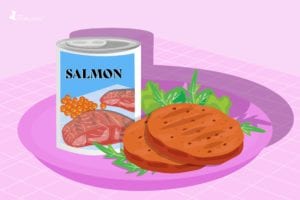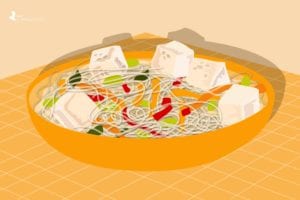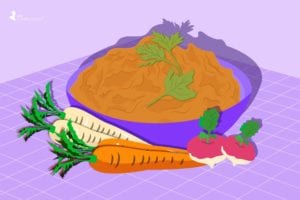Learn more about our FREE COVID-19 Patient Support Program for chronic illness patients and their loved ones.
It can be hard to figure out food during quarantine. Most of us are going to the grocery store less often, if at all. And for people with inflammatory bowel disease (IBD) — which includes Crohn’s disease and ulcerative colitis — there’s the added challenge of preparing meals that don’t require a lot of fresh ingredients that are also easy on your gastrointestinal tract. Not to mention the fact that increased stress levels might be exacerbating your symptoms beyond what you normally experience.
While there is not one universal diet that experts recommend for people with IBD, there are strategies that may help calm an active flare or soothe lingering symptoms. You may already be aware of certain “trigger foods” that exacerbate your Crohn’s or colitis symptoms, so it’s wise to avoid those, of course. There are also some diets or ways of eating that some IBD patients find helpful in controlling symptoms. These include:
Low-Residue Diet
A low-residue diet, which limits foods that increase stool output like fiber, is often suggested during active Crohn’s or colitis flares, for example.
Low-FODMAP Diet
A low-FODMAP diet limits specific “fermentable” carbohydrates that can aggravate gastrointestinal (GI) symptoms in some people. It may be helpful for people who are in remission but still experience occasional gut symptoms, found a study in the journal Gastroenterology.
We surveyed nutritionists who specialize in gut health for simple, delicious meal ideas for people with IBD. We aimed for the following requirements:
- Can be made with accessible, long-lasting pantry ingredients, such as frozen fruit, root vegetables, and canned goods
- Can be made either low-residue or low-FODMAP (if not both)
Stock up on the ingredients you need to make them and you’ll have new meals to try all week long.

1. Belly-Friendly Breakfast Muffins
Muffins are an easy morning meal. But they can be made with ingredients that can be hard on your stomach, such as wheat bran and dairy milk. This easy-to-personalize Fruit Muffins recipe from Charleston, South Carolina-based nutritionist Kathryn Adel, MS, RDN, CSSD, LD, can be made for your specific needs.
“It can be easily tailored to your preferences and intolerances,” says Adel. Plus, it’s made with basic ingredients that are easy to keep on hand.
Easy-to-Personalize Fruit Muffins
Makes 12 muffins
Ingredients:
- 1½ cup of flour of your choice (white flour for low-residue; gluten-free blends like Bob’s Red Mill 1-to-1 are also low-FODMAP)
- ½ to ¾ cup of sugar (ex: brown sugar, white sugar, cane sugar)
- Pinch of salt
- 2 Tbsp baking powder
- 3 Tbsp of melted unsalted butter or vegetable oil of your choice (ex: organic canola oil)
- 1 cup of milk or yogurt (low-FODMAP options include unsweetened almond milk or lactose-free milk)
- 1 egg or (for vegan option, use half a banana, mashed)
- 1 tsp vanilla extract (optional)
- 1 cup of low FODMAP frozen berries or fruit (ex: raspberries, blueberries, strawberries for low FODMAP; apples or peaches for low residue)
Directions:
- Preheat the oven to 375°F. Grease the muffin cups then set aside.
- Combine the flour, sugar, salt, and baking powder in a bowl then set aside.
- In another bowl, mix the melted butter or oil, dairy product (or alternative), egg (or banana), and vanilla extract. Pour on dried ingredients then mix together.
- Add the frozen fruits then pour into the muffin cups and bake for 25 minutes.

2. A Satisfying Nicoise ‘Salad’
If you hear “salad” and think, “I wish,” this Lettuce-Less Nicoise Salad from New York City-based Colleen Webb, MS, RDN has got you covered. “Eliminating the lettuce from this traditional Nicoise salad allows people with inflammatory bowel disease to enjoy a ‘salad’ without the roughage,” says Webb. Roughage refers to high-fiber foods that are generally less tolerable with Crohn’s or colitis.
Lettuce-Less Nicoise Salad
Ingredients:
- 2 hard-boiled organic eggs, roughly chopped
- 1 5-6 oz can tuna in water, drained
- 1 avocado, halved and roughly chopped
- 12 Kalamata olives, halved
- 3 Tbsp extra virgin olive oil
- Sea salt to taste
- Black pepper to taste, optional
- 3-4 Tbsp fresh dill, chopped OR 3-4 tsp dried dill
Directions:
- Prepare all ingredients as noted in ingredient list.
- Combine eggs through olives in a large bowl. Toss with olive oil.
- Season with salt, pepper and fresh dill.

3. A Better Fish Burger
Fish is a nutritious food for everyone, including those with inflammatory bowel disease, but fresh fish needs to be eaten within just a few days of purchase — not ideal for coronavirus quarantine. That’s where cans come in.
“I love using canned salmon as an easy way for people — especially those with IBD — to include this terrific source of omega-3 fat into their diet, which may help reduce inflammation,” says Jody Garelick, MS, RDN, a dietitian in Pittsburgh, Pennsylvania. Her Salmon Patties are perfect for stay-at-home orders (or any other time).
Salmon Patties
Makes 5 patties
Ingredients:
- 1 14.75 oz canned salmon
- 1 egg
- ½ c gluten-free breadcrumbs; if low-residue you can choose white breadcrumbs
- 1 tablespoon olive oil
Directions:
- Mix ingredients together in a bowl.
- Shape into patties.
- Add oil to a skillet over medium heat and cook for several minutes on each side, until browned.

4. A Nicer Noodle Dish
Research shows that plant-based diets are linked with lower levels of inflammation, which is just one of the reasons Adel loves this Asian Baked Tofu over Rice Noodles. The second reason is how convenient it is, thanks to the use of frozen veggies and tofu. “Tofu is a great protein choice during the pandemic since it can be kept in your fridge for several weeks,” says Adel.
Asian Baked Tofu over Rice Noodles
Serves 2
Ingredients:
- 1 Tbsp sesame oil
- 1 Tbsp natural smooth peanut butter
- 1 Tbsp maple syrup
- 3 Tbsp low sodium soy sauce
- 2 Tbsp lime juice
- 8 oz (1 block) extra firm organic tofu
- 2 tsp sesame oil
- 2 cups of frozen veggies like Asian-style mixed carrots, green beans, bell pepper and water chestnuts (canned carrots or string beans for low-residue)
- 1 can of baby corn, rinsed (optional)
- 6 oz of rice noodles
- Fresh cilantro (optional)
Directions:
- Preheat the oven to 400°F. Cut tofu into cubes.
- Whisk together the first 5 ingredients and toss with tofu. Spread tofu out on a lined baking sheet and bake for 20 to 25 minutes
- Cook rice noodles according to package instructions
- Heat 2 tsp sesame oil in a large pan and sauté vegetables until tender
- Split noodles between 2 bowls, and top with veggies, tofu, and cilantro

5. Stomach-Settling Comfort Food Side: Mashed Veggies
There’s just something about comfort food in trying times. And Webb’s Soothing Root Vegetable Mashdoesn’t just taste like a warm hug; it’s also easy on your gut. “More often than not, well-cooked root vegetables are a safe choice for people with IBD, thanks to their soft consistency,” says Webb. Well-cooked vegetables are low-residue compliant; the veggies listed here are also low-FODMAP in moderate portions.
Soothing Root Vegetable Mash
Ingredients:
- 2 pounds root vegetables, such as yams, turnips, carrots, parsnips
- 1/2 cup bone broth or another broth/stock
- 2 Tbsp olive or coconut oil
- 1 tsp salt
- 1/4 tsp black pepper
Directions:
- Boil or steam veggies until very soft; mash well.
- Add broth, oil, salt and pepper to veggies and stir well.
Get Free Coronavirus Support for Chronic Illness Patients
Join the Global Healthy Living Foundation’s free COVID-19 Support Program for chronic illness patients and their families. We will be providing updated information, community support, and other resources tailored specifically to your health and safety. Join now.
Cox SR, et al. Effects of Low FODMAP Diet on Symptoms, Fecal Microbiome, and Markers of Inflammation in Patients With Quiescent Inflammatory Bowel Disease in a Randomized Trial. Gastroenterology. January 2020. doi: https://doi.org/10.1053/j.gastro.2019.09.024.
Haghighatdoost F, et al. Association of Vegetarian Diet With Inflammatory Biomarkers: A Systematic Review and Meta-Analysis of Observational Studies. Public Health Nutrition. October 2017. doi: https://doi.org/10.1017/S1368980017001768.





